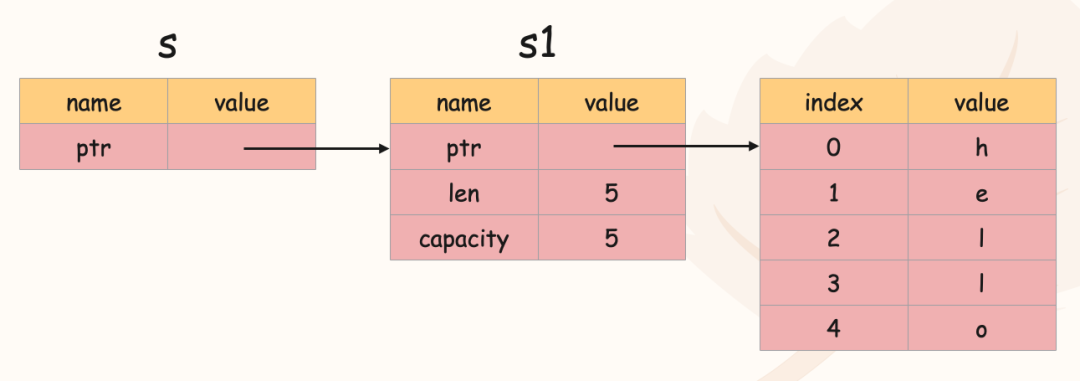介绍
Rust的时间操作主要用到chrono库,接下来我将简单选一些常用的操作进行介绍,如果想了解更多细节,请查看官方文档。
官
介绍
Rust的时间操作主要用到chrono库,接下来我将简单选一些常用的操作进行介绍,如果想了解更多细节,请查看官方文档。
官方文档:chrono - Rust
Cargo.toml引用:chrono = { version = "0.4", features = ["serde"] }
一、计算耗时
Rust标准库,一般用于计算变量start和duration之间的程序运行时间,代码如下:
use std::time::{Duration, Instant};
use std::thread;
fn expensive_function(seconds:u64) {
thread::sleep(Duration::from_secs(seconds));
}
fn main() {
cost();
}
fn cost(){
let start = Instant::now();
expensive_function(2);
let duration = start.elapsed();
println!("耗时: {:?}", duration);
}二、时间加减法
使用到chrono库的checked_add_signed方法,如果无法计算出日期和时间,方法将返回 None。比如当前时间加一天、加两周、加3小时再减4秒,代码如下:
use chrono::{Duration, Local};
fn main() {
// 获取当前时间
let now = Local::now();
println!("{}", now);
let almost_three_weeks_from_now = now.checked_add_signed(Duration::days(1))
.and_then(|in_2weeks| in_2weeks.checked_add_signed(Duration::weeks(2)))
.and_then(|in_2weeks| in_2weeks.checked_add_signed(Duration::hours(3)))
.and_then(|in_2weeks| in_2weeks.checked_add_signed(Duration::seconds(-4)))
;
match almost_three_weeks_from_now {
Some(x) => println!("{}", x),
None => eprintln!("时间超出范围"),
}
match now.checked_add_signed(Duration::max_value()) {
Some(x) => println!("{}", x),
None => eprintln!("时间超出范围,不能计算出太阳系绕银河系中心一周以上的时间."),
}
}三、时区转换
使用 chrono库的DateTime::from_naive_utc_and_offset 方法将本地时间转换为 UTC 标准格式。然后使用 offset::FixedOffset 结构体,将 UTC 时间转换为 UTC+8 和 UTC-2。
use chrono::{DateTime, FixedOffset, Local, Utc};
fn main() {
let local_time = Local::now();
let utc_time = DateTime::<Utc>::from_naive_utc_and_offset(local_time.naive_utc(), Utc);
let china_timezone = FixedOffset::east_opt(8 * 3600);
let rio_timezone = FixedOffset::west_opt(2 * 3600);
println!("本地时间: {}", local_time);
println!("UTC时间: {}", utc_time);
println!(
"北京时间: {}",
utc_time.with_timezone(&china_timezone.unwrap())
);
println!("里约热内卢时间: {}", utc_time.with_timezone(&rio_timezone.unwrap()));
}四、年月日时分秒
获取当前时间年月日、星期、时分秒,使用chrono库:
use chrono::{Datelike, Timelike, Local};
fn main() {
let now = Local::now();
let (is_common_era, year) = now.year_ce();
println!(
"当前年月日: {}-{:02}-{:02} {:?} ({})",
year,
now.month(),
now.day(),
now.weekday(),
if is_common_era { "CE" } else { "BCE" }
);
let (is_pm, hour) = now.hour12();
println!(
"当前时分秒: {:02}:{:02}:{:02} {}",
hour,
now.minute(),
now.second(),
if is_pm { "PM" } else { "AM" }
);
}五、时间格式化
时间格式化会用到chrono库,用format方法进行时间格式化;NaiveDateTime::parse_from_str方法进行字符串转DateTime,代码如下:
use chrono::{DateTime, Local, ParseError, NaiveDateTime};
fn main() -> Result<(), ParseError>{
let now: DateTime<Local> = Local::now();
// 时间格式化
let ymdhms = now.format("%Y-%m-%d %H:%M:%S%.3f");
// 字符串转时间
let no_timezone = NaiveDateTime::parse_from_str("2015-09-05 23:56:04.800", "%Y-%m-%d %H:%M:%S%.3f")?;
println!("当前时间: {}", now);
println!("时间格式化: {}", ymdhms);
println!("字符串转时间: {}", no_timezone);
Ok(())
}Rust的时间与日期操作就简单介绍到这里,关注不迷路(*^▽^*)
到此这篇关于Rust操作日期与时间的文章就介绍到这了,更多相关Rust日期与时间内容请搜索好代码网以前的文章或继续浏览下面的相关文章希望大家以后多多支持好代码网!




